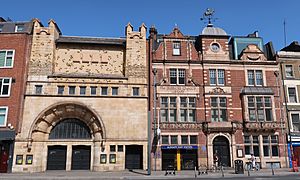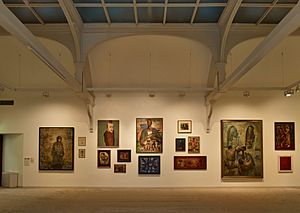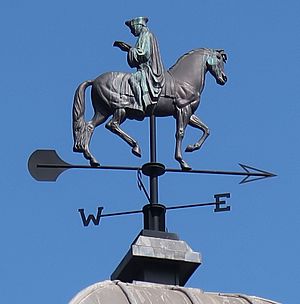Whitechapel Gallery facts for kids

The original Whitechapel Gallery to the left; and the former Passmore Edwards library building, now incorporated into the gallery, to the right
|
|
| Lua error in Module:Location_map at line 420: attempt to index field 'wikibase' (a nil value). | |
| Established | 1901 |
|---|---|
| Location | 77–82 Whitechapel High Street, London, England, United Kingdom |
| Visitors | 490,000 (April 2009 – April 2010) |
| Public transit access | |
The Whitechapel Gallery is a famous art gallery in Whitechapel, London. It opened in 1901 and was one of the first galleries in London to be funded by the public. This means it was made for everyone to enjoy art! The building itself is a cool example of the British Modern Style.
In 2009, the gallery became much bigger. It took over the old Passmore Edwards library building next door. Today, the Whitechapel Gallery shows art by artists from our time. It also holds special shows that look back at an artist's whole career.
Contents
History of the Whitechapel Gallery
The Whitechapel Gallery has a long and interesting history. In 1938, it showed Pablo Picasso's famous painting Guernica. This painting was part of a special tour. The tour was organized to protest against the Spanish Civil War.
Supporting New Artists
After World War II, the gallery became very important for British art. It helped new artists show their work. Many important exhibitions happened here. One famous show was This is Tomorrow in 1956. This exhibition helped introduce Pop Art to the public. Pop Art uses images from popular culture, like advertisements and comic books.
In 1961, the gallery held the first UK exhibition by Mark Rothko. In 1964, a show called The New Generation featured artists like John Hoyland, Bridget Riley, David Hockney, and Patrick Caulfield. These artists became very well-known.
Growing and Changing
For many years, the gallery held "open exhibitions." These shows gave local artists a chance to display their art. However, by the 1990s, these shows became less common.
In the late 1970s, other galleries like the Hayward Gallery became more popular. But in the 1980s, the Whitechapel Gallery became important again. This happened under the leadership of Nicholas Serota. The gallery was renovated in 1986. Then, in 2009, it expanded into the building next door. This made the gallery much larger. It also meant the Whitechapel Gallery could stay open all year round.
Amazing Exhibitions at Whitechapel
The Whitechapel Gallery has hosted many memorable art shows. Here are some of the notable ones:
- 1908 – An exhibition about Islamic art and life. It showed art from places like Turkey, Persia, and Egypt.
- 1956 – The This is Tomorrow exhibition. This show was very important for introducing Pop Art.
- 1958 – An exhibition featuring the American artist Jackson Pollock. He was known for his unique abstract paintings.
- 1961 – The first UK show for Mark Rothko. His way of setting up his art here became a model for his future shows.
- 1964 – The New Generation – Painting show. It featured rising stars like John Hoyland, Patrick Caulfield, David Hockney, and Bridget Riley.
- 1965 – The New Generation – Sculpture show. This exhibition highlighted sculptors like Philip King and William Tucker.
- 1982 – A special exhibition for the Mexican artist Frida Kahlo.
- 1993 – The Whitechapel Gallery showcased the work of Lucian Freud.
- 2009 – A look back at the work of Isa Genzken. Also, solo shows for Sophie Calle and Elizabeth Peyton.
- 2013 – The first big solo exhibition in London for YBA artist Sarah Lucas.
- 2015 – The first show in Britain about Arab Modernism. It was called "Imperfect Chronology: Arab Art from the Modern to the Contemporary."
- 2016 – A new art project by the feminist art group Guerrilla Girls. Also, a major show looking back at the British artist Eduardo Paolozzi.
- 2018 – A solo show for Mark Dion. Also, the first major UK show for the artist duo Elmgreen & Dragset.
Gallery Expansion and New Features
The Whitechapel Gallery reopened in April 2009. This was after a two-year project that made the gallery much bigger. They added the old Passmore Edwards library building next door. This expansion cost about £13.5 million. Part of the money came from the Heritage Lottery Fund.
As part of the expansion, new areas were created. These include an Archive Gallery and a reading room. There is also a special place to keep the Whitechapel's historical records. These records show how the gallery started. They also include letters from past directors. These letters explain important decisions in the gallery's history.
Gallery Directors
- Charles Aitken (1901–1911)
- Hugh Scrutton (1945–1952)
- Bryan Robertson (1952–1968)
- Mark Glazebrook (1969–1971)
- Jenny Stein (1972–1974)
- Jasia Reichardt (1974–1976)
- Nicholas Serota (1976–1988)
- Catherine Lampert (1988–2002)
- Iwona Blazwick (2002–2022)
- Gilane Tawadros (2022–Present)
See also
 In Spanish: Whitechapel Gallery para niños
In Spanish: Whitechapel Gallery para niños
 | Jessica Watkins |
 | Robert Henry Lawrence Jr. |
 | Mae Jemison |
 | Sian Proctor |
 | Guion Bluford |



